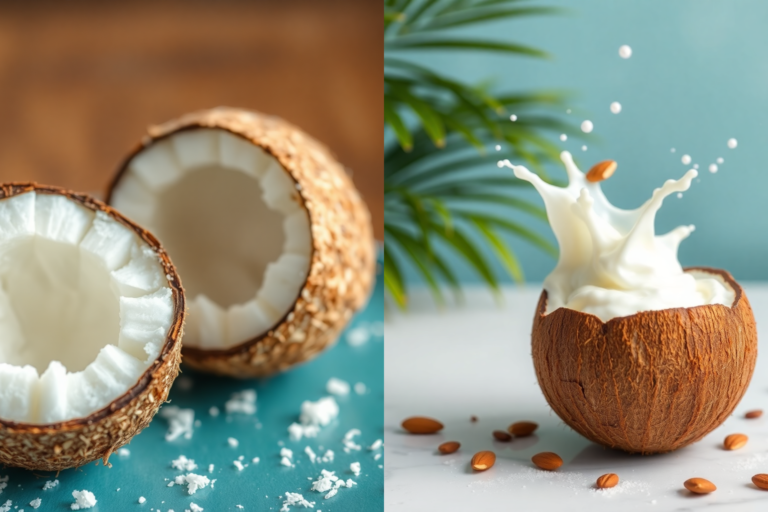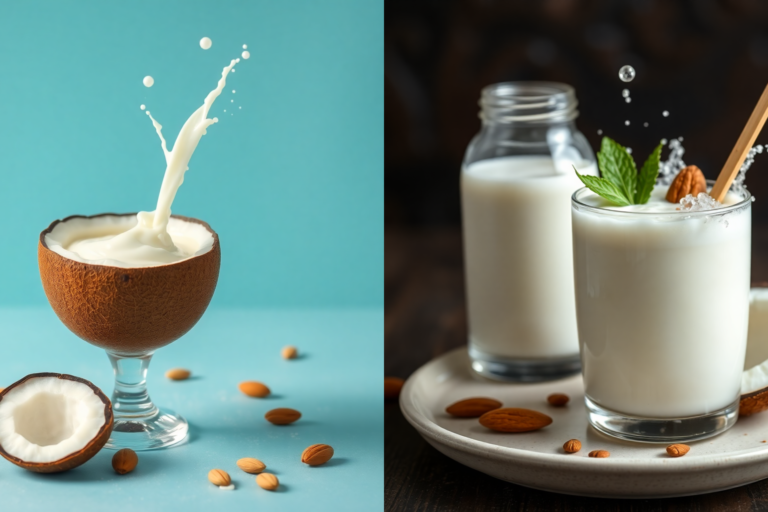Coconut Butter vs Coconut Oil: Understanding the Differences
Introduction of Coconut Butter vs Coconut Oil
Define Coconut Butter and Coconut Oil
Coconut butter and coconut oil are both derived from the flesh of mature coconuts, yet they differ significantly in composition and uses.
Brief Overview of Their Composition and Extraction Process
Coconut Butter: Coconut butter is made from the pureed meat of the coconut, including both the flesh and the natural oils. It retains the fiber from the coconut meat, giving it a thicker consistency compared to coconut oil. The process involves grinding the coconut meat until it forms a smooth paste, which solidifies at cooler temperatures.
Coconut Oil: Coconut oil, on the other hand, is extracted from the dried kernel or copra of the coconut. It undergoes a process of drying, pressing, and refining to extract the oil, which remains liquid at room temperature due to its high saturated fat content.
Composition and Nutritional Profiles
Coconut Butter vs Coconut Oil: Analyzing Their Nutritional Content
Coconut Butter Composition
Coconut butter contains both fat and fiber from the coconut meat, offering a creamy texture and a slightly sweet, nutty flavor. It is rich in medium-chain triglycerides (MCTs), which are known for their quick energy release and potential health benefits.
Coconut Oil Composition
Coconut oil is predominantly composed of saturated fats, primarily lauric acid, which is believed to have antibacterial and antiviral properties. It is commonly used in cooking, baking, and skincare due to its stability at high temperatures and moisturizing effects on the skin.
Culinary and Practical Uses
Coconut Butter vs Coconut Oil: Applications in Cooking and Beyond
Uses of Coconut Butter
- Spread and Dip: Coconut butter can be spread on toast or used as a dip for fruits and vegetables.
- Baking: It adds richness and moisture to baked goods like cookies and muffins.
- Smoothies: Blend into smoothies for added creaminess and flavor.
Uses of Coconut Oil
- Cooking: Use for sautéing, frying, and baking due to its high smoke point.
- Skin Care: Apply as a moisturizer or lip balm for its nourishing properties.
- Hair Care: Use as a conditioning treatment to promote shine and manageability.
Health Benefits and Considerations
Coconut Butter vs Coconut Oil: Comparing Their Health Impact
Health Benefits of Coconut Butter
- Dietary Fiber: Supports digestion and helps maintain a healthy gut.
- MCTs: Provides quick energy and may aid in weight management.
- Nutrient Density: Contains vitamins, minerals, and antioxidants beneficial for overall health.
Health Benefits of Coconut Oil
- Heart Health: May improve cholesterol levels and reduce the risk of heart disease.
- Antimicrobial Properties: Lauric acid exhibits antibacterial and antiviral effects.
- Skin and Hair Care: Moisturizes skin and hair, promoting health and vitality
Coconut Butter vs Coconut Oil: Unveiling Their Health Benefits
Health Benefit 1: Nutrient Content
Coconut Butter: Rich in Fiber, Vitamins, and Minerals
Coconut butter, also known as coconut manna, is made from the pureed flesh of the coconut. It retains the fiber content of coconut meat, offering about 5 grams of fiber per ounce. This dietary fiber supports digestive health by promoting regular bowel movements and aiding in nutrient absorption. Additionally, coconut butter contains vitamins such as vitamin C, E, and B-complex vitamins, along with essential minerals like iron, magnesium, and potassium. These nutrients contribute to overall well-being and immune function.
Benefits for Digestion and Nutrient Absorption
The fiber content in coconut butter helps maintain a healthy digestive system. It supports the growth of beneficial gut bacteria, which aids in digestion and improves nutrient absorption. By including coconut butter in your diet, you can enhance gastrointestinal health and ensure efficient nutrient uptake from other foods consumed.
Coconut Oil: High in Medium-Chain Triglycerides (MCTs)
Coconut oil is primarily composed of medium-chain triglycerides (MCTs), specifically lauric acid, caprylic acid, and capric acid. These fatty acids are quickly metabolized by the liver and converted into energy, making coconut oil a potent source of immediate and sustained energy. MCTs are also known for their potential to enhance metabolic rate, aiding in weight management and promoting fat burning.
Benefits for Energy and Metabolism
Consuming coconut oil can boost energy levels and endurance, making it popular among athletes and individuals seeking a natural energy source. Its metabolic benefits extend to improving cholesterol levels and supporting heart health. Regular consumption of coconut oil may also have anti-inflammatory effects, benefiting overall well-being.
Coconut Butter vs Coconut Oil: Unveiling Their Role in Heart Health
Health Benefit 2: Heart Health
When comparing coconut butter vs coconut oil, both offer distinct advantages for heart health, each with unique nutritional properties:
Coconut Butter:
Coconut butter, derived from the meat of mature coconuts, retains its natural fiber content and is rich in healthy fats, including lauric acid. Lauric acid is a medium-chain fatty acid known for its potential benefits in promoting heart health and supporting balanced cholesterol levels.
Supports Heart Health and Cholesterol Levels
The presence of lauric acid in coconut butter may contribute to maintaining healthy cholesterol levels, which is crucial for cardiovascular health. Regular consumption in moderation can be part of a heart-healthy diet.
Coconut Oil:
Coconut oil, on the other hand, is extracted from the kernel or meat of mature coconuts. It is predominantly composed of saturated fats, including medium-chain triglycerides (MCTs) like lauric acid.
Improves Cholesterol Profile
Studies suggest that coconut oil consumption can improve the ratio of good cholesterol (HDL) to bad cholesterol (LDL) in the bloodstream. This improvement in cholesterol profile is beneficial for reducing the risk of heart disease.
May Reduce Risk of Heart Disease
Due to its ability to positively influence cholesterol levels, incorporating coconut oil into a balanced diet may help lower the risk of heart disease over time. However, moderation is key, as it is calorie-dense.
Incorporating Coconut Butter and Coconut Oil into Your Diet
Coconut Butter vs Coconut Oil: Choosing Heart-Healthy Options
In Cooking and Baking
Coconut Butter: Ideal for adding richness and flavor to baked goods, sauces, and spreads. Its natural sweetness complements both sweet and savory dishes.
Coconut Oil: Suitable for high-heat cooking methods due to its stable saturated fat content. Use it for sautéing, frying, or as a dairy-free substitute in recipes.
As a Spread or Topping
Coconut Butter: Spread it on toast, pancakes, or incorporate it into smoothies and desserts for a creamy texture and tropical taste.
Coconut Oil: Use it as a dairy-free butter alternative or drizzle it over popcorn, vegetables, or baked goods for a hint of coconut flavor.
Coconut Butter vs Coconut Oil: Exploring Their Benefits for Skin and Hair Care
Health Benefit 3: Skin and Hair Care
When it comes to enhancing skin and hair health, both coconut butter and coconut oil offer unique benefits. Understanding their properties can help you choose the right option for your skincare and haircare routine.
Coconut Butter:
Moisturizing Properties for Skin and Hair: Coconut butter is rich in fatty acids and emollients that deeply moisturize the skin and hair, leaving them soft and hydrated.
Contains Antioxidants and Antimicrobial Effects: It possesses antioxidants that combat oxidative stress and antimicrobial properties that help in preventing skin infections.
Coconut Oil:
Effective as a Natural Moisturizer: Coconut oil is renowned for its ability to lock in moisture, making it an effective natural moisturizer for both skin and hair.
Helps in Treating Skin Conditions like Eczema and Dryness: Its anti-inflammatory properties can soothe skin irritations, including eczema, and alleviate dryness by restoring skin barrier function.
Coconut Butter vs Coconut Oil: Choosing the Right Option
For Intense Moisturization:
Coconut Butter tends to be thicker and richer, making it ideal for those needing intense hydration for dry skin and brittle hair.
Coconut Oil, while also moisturizing, has a lighter texture and is easily absorbed, suitable for all skin types, including oily and acne-prone skin.
For Skin Conditions:
Coconut Oil is often recommended for its anti-inflammatory properties, which can help calm irritated skin and manage conditions like eczema and psoriasis.
Coconut Butter provides a protective barrier that seals in moisture, beneficial for sensitive skin prone to irritation.
Incorporating Coconut Butter and Coconut Oil into Your Routine
Whether you choose coconut butter or coconut oil, both can be incorporated into your skincare and haircare routines:
As a Moisturizer: Apply either coconut butter or oil directly to damp skin or hair after bathing for optimal absorption and hydration.
In DIY Recipes: Blend coconut butter or oil with essential oils or other natural ingredients to create customized moisturizers, hair masks, or lip balms.
Coconut Butter vs Coconut Oil: Exploring Health Benefits
Health Benefit 4: Weight Management
When comparing coconut butter vs coconut oil, both offer distinct advantages that support weight management goals.
Coconut Butter: Provides Satiety Due to Fiber Content
Coconut butter, made from finely ground coconut meat, retains the fiber naturally found in coconuts. This fiber content contributes to feelings of fullness and satiety, which can help control appetite and prevent overeating. By including coconut butter in your diet, you may experience enhanced satisfaction from meals, reducing the likelihood of snacking on high-calorie foods.
Supports Healthy Weight Management
The combination of healthy fats and fiber in coconut butter supports a balanced approach to weight management. While it is calorically dense, the fiber helps regulate digestion and promotes a steady release of energy, reducing the likelihood of energy crashes that can lead to unhealthy food choices.
Coconut Oil: Boosts Metabolism and Fat Burning
In contrast, coconut oil is extracted from the kernel or meat of mature coconuts and consists mainly of medium-chain triglycerides (MCTs). These MCTs are metabolized differently in the body compared to other fats, leading to increased energy expenditure and fat burning. Regular consumption of coconut oil may boost metabolism, aiding in weight loss efforts when combined with a balanced diet and exercise.
May Aid in Reducing Abdominal Obesity
Research suggests that the medium-chain fatty acids in coconut oil can target fat stored in the abdominal cavity, often associated with metabolic syndrome and increased risk of cardiovascular disease. By promoting fat burning in this area, coconut oil may help reduce waist circumference and improve overall body composition.
Understanding Coconut Butter vs Coconut Oil: Health Benefit 5
Antioxidant and Anti-inflammatory Effects
Coconut Butter: Coconut butter, derived from the flesh of mature coconuts, contains antioxidants such as polyphenols. These compounds play a crucial role in combating oxidative stress and reducing inflammation in the body. By neutralizing free radicals, polyphenols in coconut butter contribute to overall cellular health and longevity.
Coconut Oil: Similarly, coconut oil offers anti-inflammatory effects that benefit overall health. It contains antioxidants like vitamin E and ferulic acid, which help to mitigate oxidative damage caused by free radicals. This protective action supports immune function and aids in reducing inflammation throughout the body.
Benefits of Antioxidant and Anti-inflammatory Effects
Coconut Butter vs Coconut Oil: Supporting Wellness
Protects Cellular Health: The antioxidants in both coconut butter and coconut oil protect cells from oxidative damage, which can lead to aging and various chronic diseases. By reducing oxidative stress, these compounds promote cellular longevity and function.
Reduces Inflammation: Chronic inflammation is linked to numerous health conditions, including heart disease, arthritis, and diabetes. The anti-inflammatory properties of coconut butter and coconut oil help to alleviate inflammation, promoting a healthier inflammatory response in the body.
Supports Immune Function: A well-functioning immune system relies on antioxidants to combat pathogens and maintain overall health. By bolstering immune function, coconut butter and coconut oil contribute to the body’s defense against infections and illnesses.
Incorporating Coconut Butter and Coconut Oil into Your Diet
Enhancing Your Health Regimen
In Cooking and Baking: Use coconut butter in recipes for added richness and flavor, such as desserts, smoothies, and sauces. Its antioxidant content enhances the nutritional profile of dishes while providing a creamy texture.
As a Cooking Oil Alternative: Coconut oil serves as a versatile cooking oil due to its high smoke point and mild coconut flavor. Use it for sautéing, frying, and baking to impart a hint of tropical taste and enjoy its health benefits.
In Skincare and Wellness Practices: Both coconut butter and coconut oil are used in natural skincare products for their moisturizing and antioxidant properties. Apply them topically to nourish the skin, condition hair, and promote overall wellness.
Conclusion
Choosing Between Coconut Butter vs Coconut Oil: While both coconut butter and coconut oil offer antioxidant and anti-inflammatory effects, their uses vary in culinary applications and skincare routines. Coconut butter’s richness and polyphenol content make it ideal for enhancing flavor and promoting cellular health. Coconut oil, on the other hand, serves as a versatile cooking oil and skincare ingredient, supporting immune function and reducing free radical damage.
Integrating Them into Your Lifestyle: Whether you prefer the creamy texture of coconut butter in recipes or the practicality of coconut oil in cooking and skincare, both options provide valuable health benefits. Incorporate coconut butter and coconut oil into your daily regimen to reap their antioxidant, anti-inflammatory, and immune-supporting advantages for overall well-being.
Coconut Butter vs Coconut Oil: Contrasting Health Benefits
Conclusion
Recap the Main Health Benefits of Coconut Butter and Coconut Oil
Both coconut butter and coconut oil are derived from the coconut fruit but serve different culinary and nutritional purposes.
Health Benefits of Coconut Oil
- High in Healthy Fats: Coconut oil is rich in medium-chain triglycerides (MCTs), which are easily metabolized by the body for quick energy.
- Supports Heart Health: Regular consumption of coconut oil may improve cholesterol levels and reduce the risk of heart disease.
- Boosts Brain Function: MCTs in coconut oil have been linked to improved cognitive function and memory.
Health Benefits of Coconut Butter
- Rich in Fiber: Coconut butter retains the dietary fiber from the coconut meat, aiding digestion and promoting satiety.
- Nutrient-Dense: It contains vitamins, minerals, and antioxidants that contribute to overall health and well-being.
- Enhances Skin and Hair Health: The vitamins and fats in coconut butter can nourish and moisturize skin and strengthen hair.
Consider Usage Based on Individual Health Goals and Dietary Preferences
When choosing between coconut butter and coconut oil, consider your health objectives and dietary needs:
- For Cooking and Baking: Coconut oil’s high smoke point makes it suitable for frying and baking, imparting a subtle coconut flavor to dishes.
- As a Spread or Ingredient: Coconut butter, with its creamy texture and fiber content, is ideal as a spread on toast or a natural sweetener in recipes.
- In Skincare and Beauty: Both coconut oil and butter can be used topically for moisturizing and nourishing skin and hair.
Incorporating Coconut Butter and Coconut Oil into Your Diet
Whether you opt for coconut butter or coconut oil, both offer unique health benefits and culinary versatility. Experiment with different recipes and cooking methods to enjoy their distinct flavors and nutritional advantages.











